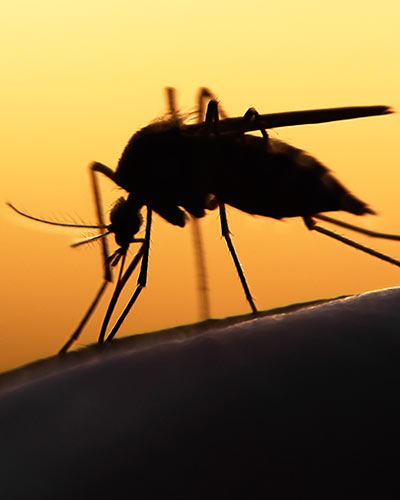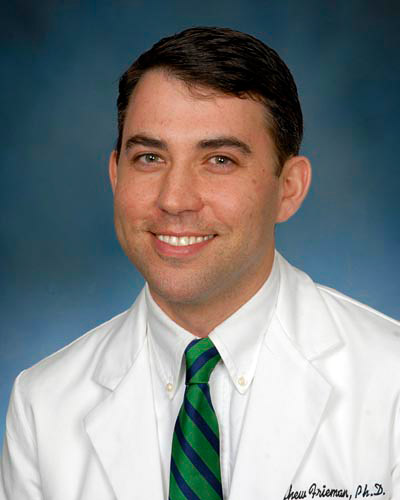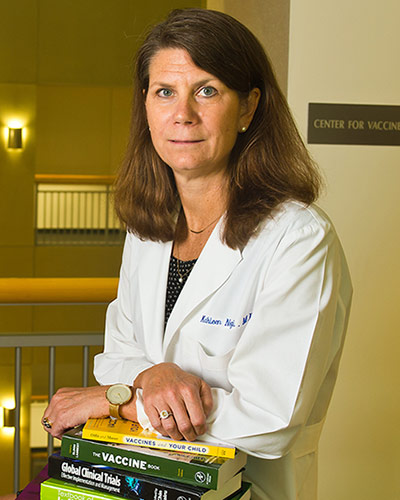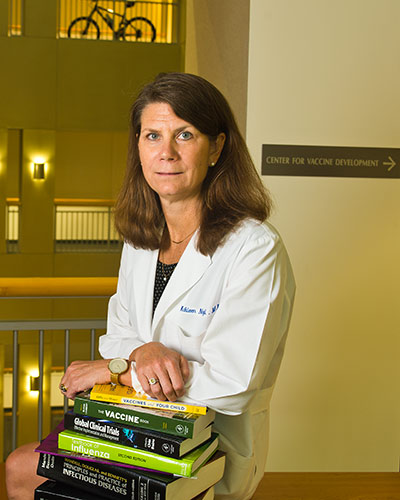June 06, 2018

Treating Those Who Have Malaria Parasite, But Don’t Have Symptoms, Could Help Stop Spread of Disease
In regions where malaria illness is widespread, it is common to find many individuals who are infected with malaria parasites (Plasmodium falciparum), but without symptoms. New research conducted by the University of Maryland School of Medicine (UMSOM) shows that treating these silent malaria cases could help stop the spread of malaria to others.
UMSOM researchers conducted a study of 114 participants in Malawi ranging from children to adults to better understand the role asymptomatic malaria infections have in the spread and occurrence of malaria illness. It is the first study to use prospective, longitudinal detection of asymptomatic malaria infection to examine subsequent risk of malaria illness among all ages.
These asymptomatic infections may never develop into illness, but they are an important contributor to the spread of malaria and pose a public health challenge.
“We know that in Malawi, like many parts of Africa, most of the malaria parasites are being carried by people who are not sick. They don’t get treatment for their infections, because their infections a silent, but when they get bitten by mosquitoes, they can transmit malaria” said Miriam Laufer, MD, MPH, Associate Professor of Pediatrics and Associate Director for Malaria Research in UMSOM’s Center for Vaccine Development and Global Health (CVD).
Researchers examined the association between asymptomatic malaria infections and subsequent risk of malaria illness and demonstrated that carrying P. falciparum infection without symptoms was associated with a 50% decrease in the risk of malaria illness.
Using a genotyping method to determine the molecular fingerprint of each parasite, they discovered when people who have asymptomatic malaria infection and get sick from malaria, it is because they acquire a new infection (from the bite of a mosquito) rather than having the asymptomatic infection develop into clinical disease. With new infections, adults and children with and without asymptomatic infection were equally likely to get sick. The researchers concluded that asymptomatic infection did not protect against new infections that made them sick.
 “We have always worried that if we give medicine to treat malaria to people with asymptomatic infection, they might get sicker the next time they get malaria. This has been a challenge to introducing new policies like mass drug administration or screening and treating campaigns to interrupt malaria transmission. Our results suggest that treating asymptomatic infection will not lead to increased risk of disease in the short term. Now we need to evaluate these new interventions to determine the long term impact both on the individual’s health and also on malaria transmission” said Dr. Laufer.
“We have always worried that if we give medicine to treat malaria to people with asymptomatic infection, they might get sicker the next time they get malaria. This has been a challenge to introducing new policies like mass drug administration or screening and treating campaigns to interrupt malaria transmission. Our results suggest that treating asymptomatic infection will not lead to increased risk of disease in the short term. Now we need to evaluate these new interventions to determine the long term impact both on the individual’s health and also on malaria transmission” said Dr. Laufer.
About the Study
Researchers enrolled participants seeking treatment for uncomplicated malaria at the Mfera Health Centre in Chikhwawa district in Malawi between June 2014 and March 2015. Subjects were eligible if they had symptomatic P. falciparum infection, detected by malaria rapid diagnostic test (RDT) and confirmed by microscopy, and were HIV-negative at time of screening. They were treated for their initial illness and then followed every month and evaluated every time they were ill.
This research was funded through the National Institutes of Health Malawi International Center of Excellence for Malaria Research and the National Institute of Allergy and Infectious Diseases (U19A1089683).
“Malaria is a serious disease impacting the most vulnerable populations. Dr. Laufer’s research is critical in our mission to help eradicate this disease,” said E. Albert Reece, MD, PhD, MBA, Executive Vice President for Medical Affairs at UM Baltimore, and the John Z. and Akiko K. Bowers Distinguished Professor and Dean, University of Maryland School of Medicine.
About the University of Maryland School of Medicine
Commemorating its 210th Anniversary, the University of Maryland School of Medicine was chartered in 1807 as the first public medical school in the United States. It continues today as one of the fastest growing, top-tier biomedical research enterprises in the world -- with 43 academic departments, centers, institutes, and programs; and a faculty of more than 3,000 physicians, scientists, and allied health professionals, including members of the National Academy of Medicine and the National Academy of Sciences, and a distinguished recipient of the Albert E. Lasker Award in Medical Research. With an operating budget of more than $1 billion, the School of Medicine works closely in partnership with the University of Maryland Medical Center and Medical System to provide research-intensive, academic and clinically-based care for more than 1.2 million patients each year. The School has over 2,500 students, residents, and fellows, and nearly $450 million in extramural funding, with most of its academic departments highly ranked among all medical schools in the nation in research funding. As one of the seven professional schools that make up the University of Maryland Baltimore campus, the School of Medicine has a total workforce of nearly 7,000 individuals. The combined School and Medical System (“University of Maryland Medicine”) has an annual budget of nearly $6 billion and an economic impact in excess of $15 billion on the state and local community. The School of Medicine faculty, which ranks as the 8th-highest public medical school in research productivity, is an innovator in translational medicine, with 600 active patents and 24 start-up companies. The School works locally, nationally, and globally, with research and treatment facilities in 36 countries around the world. Visit medschool.umaryland.edu/
About the Malaria Research Program
The Center for Vaccine Development and Global Health’s Malaria Research Program aims to support global malaria eradication efforts by developing and deploying innovative tools for improved malaria treatment, prevention and surveillance. In the program’s molecular parasitology and immunology laboratories in Baltimore and at field research sites across Africa and Asia, researchers lead epidemiological studies and clinical trials of malaria drugs and vaccines. Researchers also investigate antimalarial drug resistance, molecular and genomic epidemiology, immunoepidemiology, pathogenesis, malaria in pregnancy and interactions between malaria and co-infections including HIV and schistosomiasis. Visit medschool.umaryland.edu/malaria/
Contact
Office of Public Affairs
655 West Baltimore Street
Bressler Research Building 14-002
Baltimore, Maryland 21201-1559
Contact Media Relations
(410) 706-5260
Related stories

Thursday, March 28, 2024
NIH selects Dr. Kathleen Neuzil as Director of The Fogarty International Center
Kathleen M. Neuzil, MD, MPH, Director of the University of Maryland School of Medicine’s (UMSOM) Center for Vaccine Development and Global Health, has been named the 13th director of the Fogarty International Center (FIC), which is part of the National Institutes of Health (NIH). Dr. Neuzil will be the first woman to hold the permanent directorship since the center’s founding in 1968 and will also hold the position of Associate Director for International Research at NIH.

Friday, February 05, 2021
UM School of Medicine Researchers Demonstrate Strong Immune Response for New COVID-19 Vaccine in Pre-Clinical Tests
Researchers at the University of Maryland School of Medicine (UMSOM) have found promising results in pre-clinical studies for a new experimental vaccine against COVID-19 made by Novavax. The vaccine was found to generate a robust immune response in animals exposed to the vaccine with strong data indicating safety and efficacy, according to the study published recently in the journal Nature Communications. The results have been used to begin testing the vaccine in human trials in the U.S. with a Phase 3 trial that recently launched at the UMSOM’s Center for Vaccine Development and Global Health.

Tuesday, December 10, 2019
UMSOM Researchers to Test Vaccine Designed to Protect Against Serious Illness from Contaminated Food and Water
Each year, millions of people contract serious diarrheal illnesses typically from contaminated food and water. Among the biggest causes of diarrheal diseases are the bacteria Shigella and enterotoxigenic Escherichia coli (ETEC), and researchers at the University of Maryland School of Medicine are testing a vaccine designed to offer protection against these serious pathogens.

Friday, September 20, 2019
UM School of Medicine's Center for Vaccine Development and Global Health Receives NIH Contract of up to More than $200 Million for Influenza Research
Kathleen Neuzil, MD, MPH, Professor of Medicine and Pediatrics and Director of the Center for Vaccine Development and Global Health (CVD) at the University of Maryland School of Medicine (UMSOM) and Dean E. Albert Reece, MD, PhD, MBA, announced that CVD has been awarded a contract from the National Institute of Allergy and Infectious Diseases (NIAID), with total funding up to more than $200 million over seven years if all contract options are exercised.

Tuesday, August 13, 2019
UM School of Medicine Researchers Begin Phase 1 Clinical Trial of Vaccine Against Mosquito-Borne Diseases
Mosquito-borne diseases including malaria, dengue and yellow fever, have a severe impact resulting in millions of deaths worldwide, hitting the world’s most vulnerable populations the hardest. Researchers at the University of Maryland School of Medicine (UMSOM) have begun testing an experimental vaccine that is designed to protect against a series of these diseases.

Friday, November 02, 2018
UMSOM Global Health Expert Named to Prestigious World Health Organization Immunization Panel
Kathleen Neuzil, MD, MPH, Professor of Medicine and Pediatrics and Director of the Center for Vaccine Development and Global Health (CVD) at the University of Maryland School of Medicine (UMSOM), has been named to the World Health Organization’s (WHO) Strategic Advisory Group of Experts (SAGE) on Immunization.

Sunday, October 28, 2018
American Society of Tropical Medicine & Hygiene Awards Dr. Miriam Laufer the LePrince Medal for Malaria Research
Miriam Laufer, MD, MPH, Professor of Pediatrics and Associate Director for Malaria Research at the University of Maryland School of Medicine’s (UMSOM) Center for Vaccine Development and Global Health (CVD), was awarded the Joseph Augustin LePrince Medal by the American Society of Tropical Medicine and Hygiene (ASTMH).

Tuesday, May 15, 2018
Tackling Malaria Transmission in Sub-Saharan Africa
Two malaria experts in the Center for Vaccine Development and Global Health at the University of Maryland School of Medicine wrote a commentary published in the June Issue of The Lancet Global Health discussing the prevalence of malaria in school-age children in sub-Saharan Africa. Miriam Laufer, MD, Associate Professor of Pediatrics and Associate Director for Malaria Research CVD, and Lauren Cohee, MD, Instructor, Pediatrics, noted that often malaria infection is more common in school-age children than younger children and adults.

Friday, May 11, 2018
Honoring Dr. Robert Edelman for Three Decades of Service at UMSOM
Dr. Robert Edelman’s legacy will live long past his tenure at the Center for Vaccine Development and Global Health (CVD). Prior to an esteemed career in academia, he served in the military and the US public health service.

Thursday, May 03, 2018
Low Efficacy Influenza Vaccines Can Still Significantly Avert Infections, Study Shows
Research published in PNAS, showed that even less effective influenza vaccines can still help to reduce illnesses, hospitalizations and other issues as long as the vaccine is broadly administered across age groups.